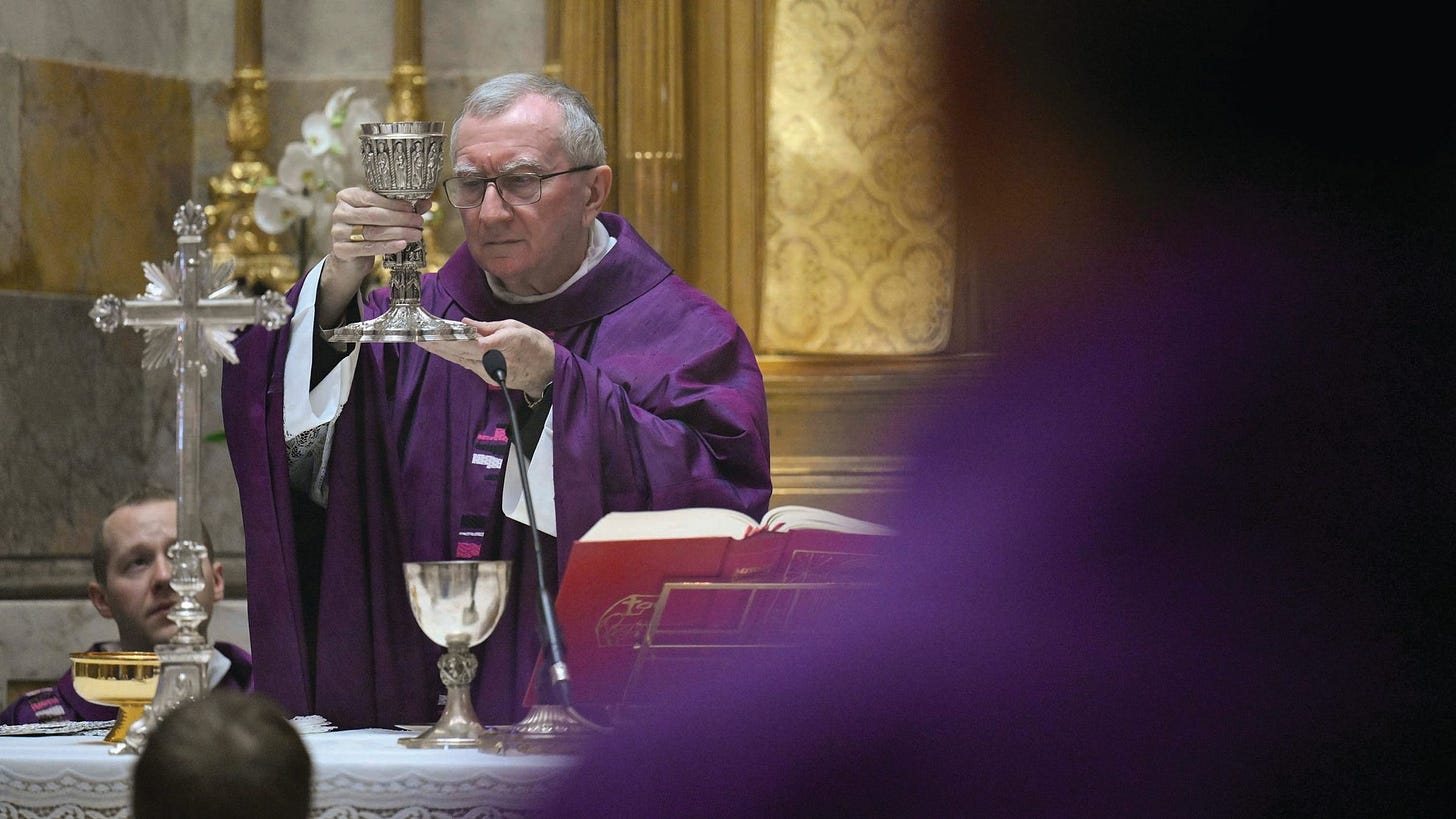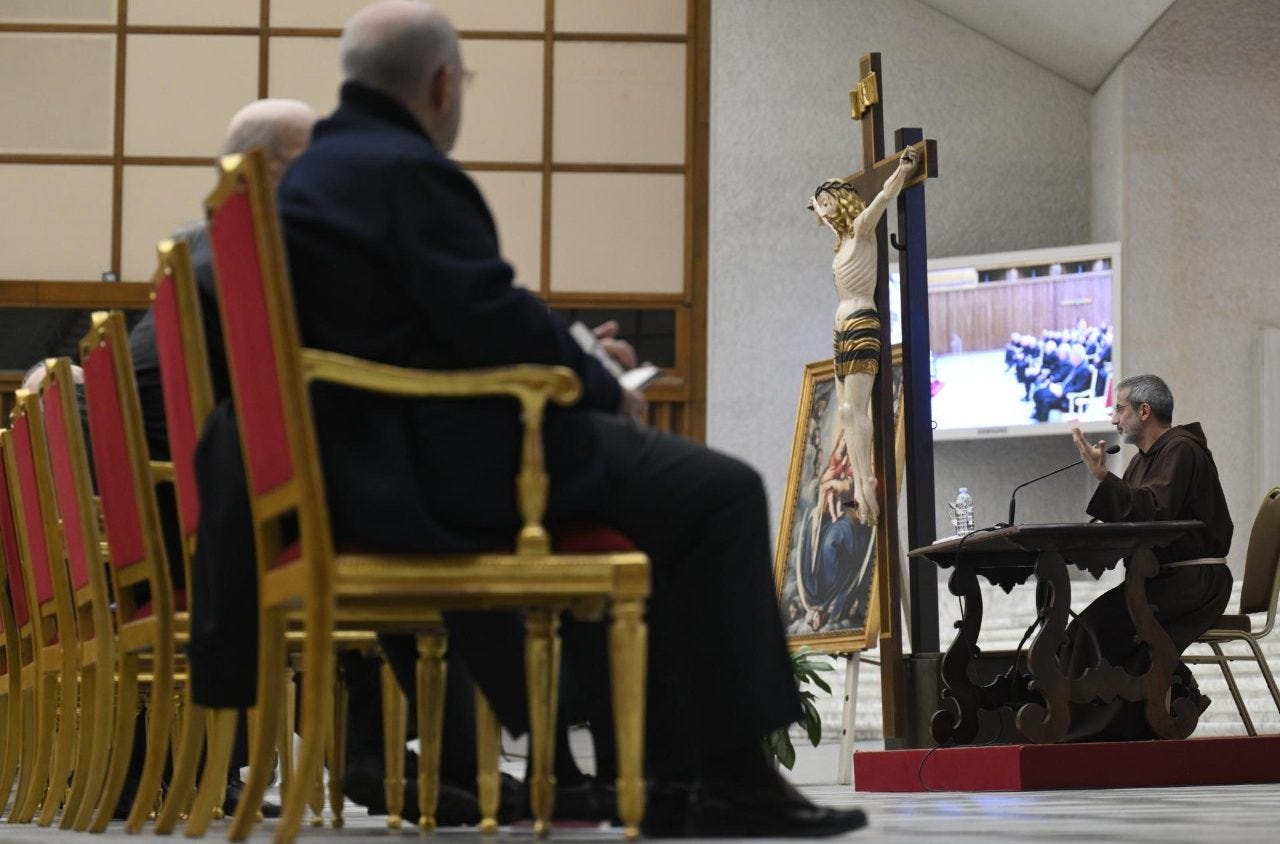Cardinal Parolin Urges Faithful to "Disarm Language" During Mass to Pray for Pope Francis
Holy See diplomats, who requested the Mass for the hospitalized 88-year-old Francis, joined Cardinal Pietro Parolin at the Pauline Chapel of the Apostolic Palace,

By Gary Gately
The Vatican’s secretary of state celebrated a Mass Friday where he joined the diplomatic corps accredited to the Holy See in praying for Pope Francis’ recovery while stressing the need to “disarm language” that fuels hatred, division and war.
“We gather in prayer this morning for the intention of the Holy Father’s health, that he may recover and return soon among us,” Cardinal Pietro Parolin said in his homily a month into the 88-year-old Francis’ stay at Rome’s Gemelli Hospital.
The Holy See Press Office, meanwhile, said the pontiff remained in stable condition and that his recovery from double pneumonia is “progressing steadily” and that he prayed through much of the day Friday as he received oxygen treatment and respiratory physiotherapy.
The diplomats had requested the Mass for Pope Francis, who marked the 12th anniversary of his papacy Thursday, when hospital staff surprised him with a cake decorated with 12 candles, and he received hundreds of drawings, messages and letters from throughout the world, many of them from children.
In his homily, Parolin said: “We are called first of all to seek relation with God in others, those around us.… Charity, love for our neighbor, is the proving ground of our love for God. Charity, therefore, has priority over all other obligations, including those of worship. That is why the duty of reconciliation comes before making an offering at the altar.
“How can we love God whom we don’t see if we don’t love our brother, whom we do see?”
Parolin said the faithful must “put aside every strategy of confrontation to embrace good sentiments” and reconcile with others who have hurt us or whom we have hurt.
“On our own we cannot manage; we need help, but it is also true that the Lord provides us with the means to realize his word,” he said.
“If you don’t go beyond the human logic in seeking God’s will, you will never find it.”
Christians would do well to heed Pope Francis’ reminder to make a habit of employing these words in all our relationships: “Please, sorry and thank you.”
“Who among us doesn’t need to ask forgiveness of someone or say sorry to someone?” Parolin asked.
He warned against “aggressive, offensive language” toward others, adding:
“It is there, the Lord reminds us, that the war begins — words of contempt and hatred toward others.”
Pointing to wars "bloodying our planet," Parolin said that diplomats know they begin not on a battlefield but are born “in the human heart, in feelings of hatred and hostility.”
Parolin quoted the day’s Gospel, Matthew, in which Jesus warned: “You have heard that it was said to your ancestors, ‘You shall not kill; and whoever kills will be liable to judgment.’ But I say to you, whoever is angry with his brother will be liable to judgment.”
Jesus equated anger with killing, Parolin said.
"It seems a bit exaggerated, a bit extreme,” he added, “but it is that way, isn't it?"
Parolin celebrated the the Mass in the ornate Pauline Chapel of the Apostolic Palace, where the last two murals Michelangelo ever painted hang: one depicting the crucifixion of St. Peter; the other, the conversion of St. Paul. The cardinal thanked the diplomatic corps for requesting the Mass to pray for Pope Francis’ recovery.
“Purified by the Lord’s word,” Parolin said, “our prayer for the Holy Father’s health gains new strength, rising with confidence to the giver of all good.”

Francis, the first Jesuit pontiff, followed via video link on Friday the 10th and final reflection of the 2025 Lenten Spiritual Exercises of the Roman Curia, delivered by the preacher of the papal household, Capuchin Father Roberto Pasolini, in the Paul VI Audience Hall. The Roman Cura’s practice is modeled on the Spiritual Exercises of St. Ignatius of Loyola.
Pasolini wrote in a summary of his reflection: “Life, with its beauty and difficulties, presents us with a crucial question: What is the meaning of our journey in this world when everything is destined to end? Without hope in eternity, the weight of reality can crush us or make us cynical, leading us to resignation….
“In the Eucharist, a mysterious exchange takes place: We offer our lives to God and receive Christ Himself in return, who transforms us in His love. In every Mass we celebrate, everything we are is taken up into the life of Christ, who presents it before the Father. It is not a symbolic ritual but a real process of transformation of our being, making us participants in eternal life even in the present.”



